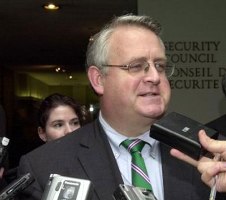Divided US administration takes a toll on Bush special envoy to Sudan
December 21, 2007 (WASHINGTON) — President Bush’s special envoy to Sudan, Andrew S. Natsios, resigned yesterday amid continuing frustration in Congress, the administration and the human rights community over the slow pace of deployment of international peacekeepers to war-ravaged Darfur.

In an interview, Natsios said his departure has long been planned and is related to his desire to return to full-time teaching at Georgetown University. But he has also been at the center of intense bureaucratic battling over what to do about the humanitarian disaster in Sudan’s Darfur region, and associates said Natsios appeared weary of the constant infighting. He also alienated others in the bureaucracy with what they regarded as his freelancing style.
Professor Eric Reeves, one of Natsios’ staunchest critics, told Sudan Tribune that the special envoy’s tenure “was anything but a success for US policy, either in Darfur or in securing from Khartoum compliance with the north/south Comprehensive Peace Agreement (CPA)”.
Bush has adopted Darfur as a special cause, and has become one of the few world leaders to describe the killing there since 2003 as genocide. But he has been repeatedly stymied in his efforts to marshal an effective international response to the crisis in Darfur, in the western part of Sudan, where fighting has claimed at least 200,000 lives and displaced more than 2 million people.
Natsios’s departure comes as the United Nations once again struggles to expand an existing African Union force of 7,000 troops into a more robust international force of 26,000 peacekeepers. U.N. officials have had little luck persuading countries to contribute the 24 helicopters needed for the mission. The government of Sudan, considered a major instigator of the violence, has thrown up various roadblocks after initially accepting the idea of the new force.
Natsios said in the interview that he was hopeful the peacekeeping force would begin to grow, noting that 800 troops from Rwanda had just arrived and 2,400 from Egypt and Ethiopia are set to deploy shortly. “It’s slow, I admit that, but it’s happening,” he said.
Natsios, a former head of the U.S. Agency for International Development who has been involved in Sudan affairs for decades, said that the killing in Darfur has dropped considerably in the past year and that the greater danger in Sudan is the revival of a north-south civil war that claimed millions of lives in the 1980s and 1990s.
“It’s not stable. It’s anarchy,” Natsios said of Darfur. “But our ability to put it back together is going to take a long time, and we need to be patient.”
Natsios’s assessment of conditions in Darfur has put him at odds from time to time with the religious and human rights groups that have pressed for more aggressive U.S. action on Sudan. They greeted Natsios’s departure with concern that the president was replacing one part-time envoy with another.
Professor Reeves said that Natsios “recently spent far too much time criticizing the fractious rebel groups and too little convincing Khartoum that there would be a meaningful international price to pay for continuing to obstruct deployment of the UN/African Union force to Darfur”.
The Save Darfur Coalition, an alliance of more than 180 faith-based, advocacy and human rights organizations called for a new direction in US policy towards Sudan.
“Al-Bashir’s scorched earth campaign against civilians is not part-time, the Janjaweed reign of terror is not part-time, and the sense of insecurity and fear in Darfur is not part-time,” said Sam Bell, Save Darfur Coalition board member and Genocide Intervention Network director of advocacy.
“So there is no excuse for part-time U.S. engagement on this issue. In light of recent diplomatic developments, the president must now seize this opportunity to appoint a high-level, full-time special envoy whose sole function is full-time diplomatic engagement on this critical issue. Half measures and part-time efforts have clearly failed the people of Darfur” he added.
“This needs to be more than just a fresh face in that position,” said Sen. Robert Menendez (D-N.J.), a key supporter of recent legislation to protect the right of states to divest from companies with connections to Sudan. “To this point, we’ve seen only spurts of engagement and muscle from the administration, surrounded by long droughts of silence and passiveness.”
Bush is considering whether to sign the divestment bill, which has raised concerns among senior advisers as a possible encroachment on foreign policy.
Some advocates expressed satisfaction with the appointment of Williamson, a onetime Reagan White House aide who served earlier in this Bush administration as an envoy to the United Nations and the U.N. Human Rights Commission in Geneva.
“If given the opportunity to work directly for and with President Bush, and not get entangled in the staff-level internecine turf wars, he has a real chance of making a difference in Sudan,” said John Prendergast, a former Clinton administration Africa expert who described Williamson as a “heavyweight diplomat.”
Williamson said in an interview that he will meet with Bush in early January and that he intends to “draw up some practical proposals and put some diplomatic muscle so we can advance the ball.” He said the dynamic needs to change on Darfur: “Right now, there are too many people who find it too agreeable to have a status quo. And no matter the human suffering, they are unwilling to act.”
International experts estimate 200,000 people have died in the conflict, which Washington calls genocide, a term European governments are reluctant to use. The Sudan government says 9,000 people have been killed.
(Washington Post / ST)
